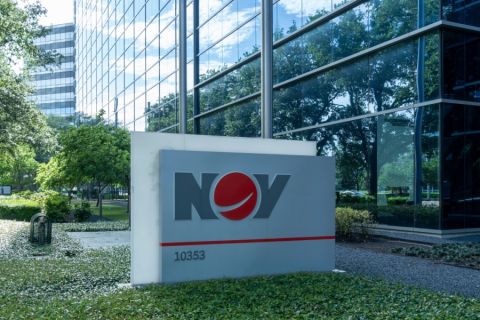Two major surveys are predicting global E&P spending growth of up to 9% in 2004 compared with 2003 budgets. While smaller increases are expected in U.S. spending, the majority of the growth is forecast to emerge from international markets. This growth is expected to offset a decline in Canadian spending. The first survey to hit the wire was from Lehman Brothers, and it includes 350 oil and gas companies. Results indicate that those companies are planning an increase of 8.8% in their worldwide E&P expenditures to $157.8 billion, compared with 2003 spending. In December, they had expected 4.0% more global E&P expenditures in 2004. U.S. E&P spending is expected to total 4.3% more in 2004 than last year. Companies that spend less than $50 million have increased their cash budgets by about 20%; independents are budgeting 4.2% more year-over-year, compared with a forecasted 2.5% increase at year-end. The majors expect to increase spending 4.4% in 2004. James Crandell, an oil-service analyst for Lehman Brothers, points to elevated cash flows and, in some cases, the availability of prospects as major catalysts behind the large independents' budget increases. According to the survey, independents expecting significant 2004 spending gains include Apache Corp. (+$200 million) and Chesapeake Energy Corp. Lehman Brothers cites underspending of 2003 budgets and strategic additions to 2004 budgets as key factors in the reversal in spending for the majors. A surprise was the strength of the majors' international E&P spending, which the Lehman Bothers survey indicates is now estimated to grow a firm 11.9% in 2004. This gain is almost double the 6% increase the majors expected in Lehman's 2003 year-end survey. The survey results acknowledge the jump in 2004 spending and point to both government-owned companies such as Pemex (+22%), PDVSA (+51%) and Petrobras (+29%) and majors such as Repsol (+85%), BG Group (+32%), Royal Dutch Shell (+23%), Total SA (+15%) and ConocoPhillips (+14%) for the influx. In contrast to these increases, five Russian companies included in the survey had weaker spending than Lehman Brothers previously estimated-Yukos (-17% year-over-year), Gazprom (-12%) and Lukoil (-3%). Canadian spending is predicted to be weaker in 2004 due primarily to seasonably good weather during this past winter drilling season and overspending of 2003 budgets. Canadian spending is now estimated to be down 2.2% for 2004, compared with the flat spending Lehman Brothers estimated in its December 2003 survey. A survey by Citigroup had results similar to those of Lehman Brothers. The midyear update to its annual E&P spending survey polled 224 oil and gas companies and predicts worldwide spending growth for 2004 of 7.5%-largely due to a boost in international budgets. Meanwhile, North American spending is expected to inch upward 1.8%, and spending in Canada may decline 4%. According to Geoff Kieburtz, an oil-service analyst for Citigroup, the 10.2% increase in international spending has been driven by a broadening recovery in several markets. Although he maintains that specific areas of weakness remain, such as the North Sea, he notes the scope of international spending growth in general seems to be increasing. He now predicts North American spending will rise 1.8% instead of the 0.7% increase initially forecast in December, and U.S. spending growth is now expected to be 4.6% instead of just 0.6%. He also found that Canadian spending will decline-4.0%, instead of the 0.9% increase projected last year. The decline in Canadian spending results from overspending in 2003 and a renewed focus on M&A over drilling, according to Kieburtz. He also notes that budget sensitivity to oil and gas prices is declining: nearly all respondents reviewing 2004 spending plans are considering increases. However, he adds, "the oil and gas prices required to trigger significant spending increases have risen sharply, and the number of companies reviewing 2004 plans is significantly lower than in recent years, at only 31% of respondents compared with the five-year average of 50%." -Bertie Taylor
Recommended Reading
NOV Announces $1B Repurchase Program, Ups Dividend
2024-04-26 - NOV expects to increase its quarterly cash dividend on its common stock by 50% to $0.075 per share from $0.05 per share.
Repsol to Drop Marcellus Rig in June
2024-04-26 - Spain’s Repsol plans to drop its Marcellus Shale rig in June and reduce capex in the play due to the current U.S. gas price environment, CEO Josu Jon Imaz told analysts during a quarterly webcast.
US Drillers Cut Most Oil Rigs in a Week Since November
2024-04-26 - The number of oil rigs fell by five to 506 this week, while gas rigs fell by one to 105, their lowest since December 2021.
CNX, Appalachia Peers Defer Completions as NatGas Prices Languish
2024-04-25 - Henry Hub blues: CNX Resources and other Appalachia producers are slashing production and deferring well completions as natural gas spot prices hover near record lows.
Chevron’s Tengiz Oil Field Operations Start Up in Kazakhstan
2024-04-25 - The final phase of Chevron’s project will produce about 260,000 bbl/d.




